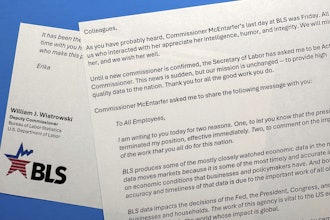
Many years ago I was a volunteer referee for a local teenage basketball program. During one game, there was a play in which the ball went out of bounds and I hesitated before making the call as to which team should have possession. Some spectators in the stands were upset and let me know it.
After the game, the other senior referee (an HR person for a Fortune 500 company) called me aside and told me what he considered the key to being a good official and, in turn, being a good manager. “Be decisive,” he said. “People just can’t stand indecisiveness.”
That was a good lesson that served me well over the years, both in my own managerial capacity as well as observing my own supervisors. I’ve had good bosses and bad bosses - and the good ones were decisive, didn’t pass the buck, and were unafraid of reaching a decision. This is something I’ve written about before and it’s as important now as it was then.
So what other characteristics makes a good manager - and why do many companies fail in filling managerial positions?
Gallup.com recently published a survey in which they found that companies fail to choose the candidate with the right talent for management 82% of the time (You can — and should — read the entire blog at www.gallup.com).
“Bad managers cost businesses billions of dollars each year, and having too many of them can bring down a company. The only defense against this problem is a good offense, because when companies get these decisions wrong, nothing fixes it. Businesses that get it right, however, and hire managers based on talent will thrive and gain a significant competitive advantage,” Gallup reported.
Gallup has studied performance at hundreds of organizations and measured the engagement of 27 million employees and more than 2.5 million work units over the past two decades.
The research firm finds that great managers have the following talents:
- They motivate every single employee to take action and engage employees with a compelling mission and vision.
- They have the assertiveness to drive outcomes and the ability to overcome adversity and resistance.
- They create a culture of clear accountability.
- They build relationships that create trust, open dialogue, and full transparency.
- They make decisions based on productivity, not politics.
I’d add communication to Gallup’s list. Poor managers do not communicate effectively nor do they take the time to listen to employees.
Bill Stevens, a global human resources executive, agrees and says that managers manage for the most part but do not engage their direct reports. They tell rather than ask for input. And just as important, these poor managers fail to totally tap the resources of their human capital.
Gallup's research reveals that about one in 10 people possess the talent to manage. Though many people have some of the necessary traits, Gallup said, few have the unique combination of talent needed to help a team achieve excellence in a way that significantly improves a company's performance.
The study also showed that two in 10 people exhibit some characteristics of basic managerial talent and can function at a high level if their company invests in coaching and developmental plans for them. The problem is that few companies have a mentoring program in place to help managers succeed.
Many industries, including industrial distribution, promote employees to management based on a person’s past performance, not if they have the talent to become a good manager.
One of my best friends, for example, was the top outside salesperson for his company and was soon promoted to sales manager. After only three months in his position, he discovered he hated the job. He did too much paperwork, felt confined when he was in the office, and would rather be on the road meeting with customers than meeting with upper management.
He was fortunate as both he and top managers agreed he should go back to selling.
The bottom line: It’s a waste of time for many companies to hire a manager who isn’t cut out for the job or try to adapt them to the role without proper mentoring and training.
Companies need to take more time in deciding whom to promote or hire to managerial positions. It’s in their best interest in the long run.






















